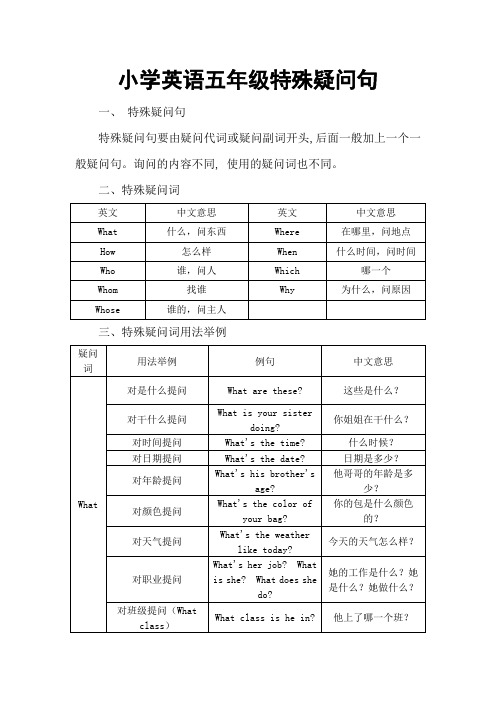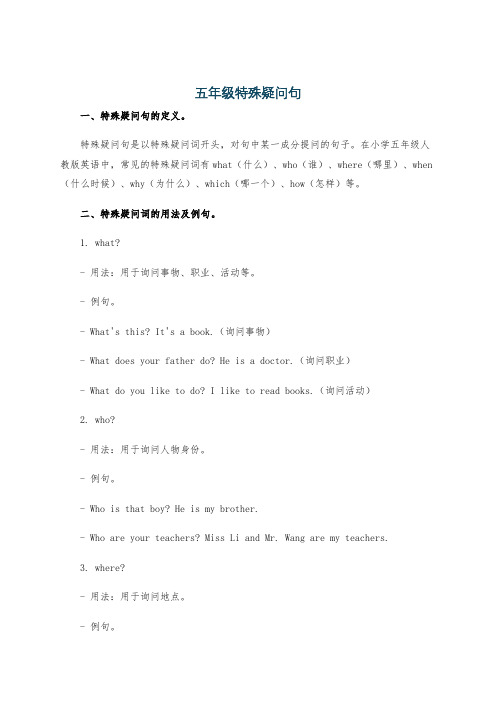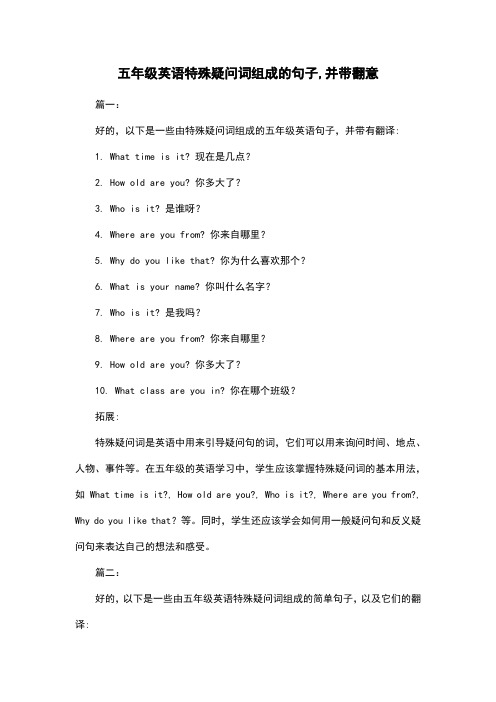小学五年级英语特殊疑问句语法
五年级上册英语的特殊疑问句和答语的语句

五年级上册英语的特殊疑问句和答语的语句Special interrogative sentences in English refers to questions that require a specific piece of information as an answer. In Chinese, 特殊疑问句指的是需要具体信息作为答案的问题。
For example, questions starting with words like "what," "where," "when," "why," "who," and "how" are considered special interrogative sentences. 例如,以“什么”、“在哪里”、“什么时候”、“为什么”、“谁”和“怎么”等词开头的问题被认为是特殊疑问句。
One common special interrogative sentence in English is "Where do you live?" In Chinese, this would be translated as “你住在哪里?” These types of questions help gather specific information about a person or a situation. 这些问题有助于获取有关一个人或一个情况的具体信息。
Being able to ask and understand special interrogative sentences is important in daily communication as they help in clarifying doubts and seeking information. 能够询问和理解特殊疑问句在日常交流中很重要,因为它们有助于澄清疑问和获取信息。
小学英语五年级特殊疑问句

小学英语五年级特殊疑问句一、特殊疑问句特殊疑问句要由疑问代词或疑问副词开头,后面一般加上一个一般疑问句。
询问的内容不同, 使用的疑问词也不同。
二、特殊疑问词三、特殊疑问词用法举例四、疑问词填空练习【牛刀小试】1.( ) do you like?2.( ) many birds do you see?3.( ) is that man?4.( )can you do ?5.—( ) your name?—My name’s Amy.6.—( ) this/that?—It’s a bear!7.—( ) do you like?—I like watermelons.8.—( ) in the classroom?—One blackboard, one TV, many desks and...—It’s blue and white.10.—( )would you like for dinner?—I’d like some beef and noodles.11.—( )your father’s job?—My father is a doctor.12.—( )time is it?—It’s 9 o’clock.13.—( ) the weather like in London?—It's rainy.14.—( ) are these/those?—They are tomatoes.15.—( )are you?—I’m fine. Thank you./ Very well. Thanks. 16.—( )old are you?—I’m twelve years old.17.—( ) many kites do you see/have?—I see/have ten kites.18.—( ) many people are there in your family? —Nine.19.—( ) much is it?—It’s 89 dollars.—I’m from the USA. 21.—( ) is my car?—It’s under the chair. 22.—( )is it?—It’s near the window.’23.—( ) is the library? —It’s on the second floor.24.—( )is that boy?—He is my brother. 25.—( )is he?—He is Zhang Peng. 26.—( )coat is it?—It's your father’s. 27.—( )are these? —They are mine.28.( )is the crayon?—It's in the pencil box. 29.( ) is that girl? ---She is my sister .。
五年级特殊疑问句

五年级特殊疑问句一、特殊疑问句的定义。
特殊疑问句是以特殊疑问词开头,对句中某一成分提问的句子。
在小学五年级人教版英语中,常见的特殊疑问词有what(什么)、who(谁)、where(哪里)、when (什么时候)、why(为什么)、which(哪一个)、how(怎样)等。
二、特殊疑问词的用法及例句。
1. what?- 用法:用于询问事物、职业、活动等。
- 例句。
- What's this? It's a book.(询问事物)- What does your father do? He is a doctor.(询问职业)- What do you like to do? I like to read books.(询问活动)2. who?- 用法:用于询问人物身份。
- 例句。
- Who is that boy? He is my brother.- Who are your teachers? Miss Li and Mr. Wang are my teachers.3. where?- 用法:用于询问地点。
- 例句。
- Where is your school? It is near my home.- Where are you going? I'm going to the park.4. when?- 用法:用于询问时间。
- 例句。
- When do you get up? I get up at six o'clock.- When is your birthday? It's in May.5. why?- 用法:用于询问原因。
- 例句。
- Why are you late? Because I missed the bus.- Why do you like spring? Because it's warm and beautiful.6. which.- 用法:用于在一定范围内询问哪一个。
五年级英语特殊疑问词组成的句子,并带翻意

五年级英语特殊疑问词组成的句子,并带翻意篇一:好的,以下是一些由特殊疑问词组成的五年级英语句子,并带有翻译:1. What time is it? 现在是几点?2. How old are you? 你多大了?3. Who is it? 是谁呀?4. Where are you from? 你来自哪里?5. Why do you like that? 你为什么喜欢那个?6. What is your name? 你叫什么名字?7. Who is it? 是我吗?8. Where are you from? 你来自哪里?9. How old are you? 你多大了?10. What class are you in? 你在哪个班级?拓展:特殊疑问词是英语中用来引导疑问句的词,它们可以用来询问时间、地点、人物、事件等。
在五年级的英语学习中,学生应该掌握特殊疑问词的基本用法,如 What time is it?, How old are you?, Who is it?, Where are you from?, Why do you like that?等。
同时,学生还应该学会如何用一般疑问句和反义疑问句来表达自己的想法和感受。
篇二:好的,以下是一些由五年级英语特殊疑问词组成的简单句子,以及它们的翻译:1. What time is it? 现在是几点?2. Where are you from? 你来自哪里?3. Who is that? 是谁啊?4. When did you go to the park? 你什么时候去公园的?5. Why do you like pandas? 你为什么喜欢熊猫?6. How old are you? 你多大了?7. What is your name? 你叫什么名字?8. Where are you from? 你来自哪里?9. Who is your teacher? 你的老师是谁?10. When are you going to the park? 你什么时候去公园?在这些句子中,特殊疑问词被用来询问个人信息、事件、地点或时间。
五年级上册英语的特殊疑问句和答语的语句

五年级上册英语的特殊疑问句和答语的语句在我们学习五年级上册英语的过程中,特殊疑问句和答语可是非常重要的一部分。
特殊疑问句能够帮助我们获取更多具体的信息,而答语则是对这些问题的回应。
先来说说特殊疑问句。
特殊疑问句是用特殊疑问词引导的问句,常见的特殊疑问词有“what(什么)”“where(哪里)”“who(谁)”“whose (谁的)”“when(什么时候)”“why(为什么)”“how(怎么样)”等等。
比如,“What do you like?” (你喜欢什么?)这就是用“what”引导的特殊疑问句,在回答这个问题时,我们可以说“I like apples” (我喜欢苹果。
)再看“Where is the library?” (图书馆在哪里?)这里用的是“where”,如果要回答,可以是“The library is near the school” (图书馆在学校附近。
)“Who is your best friend?” (谁是你最好的朋友?)这是由“who”开头的特殊疑问句,回答可能是“My best friend is Lily”(我最好的朋友是莉莉。
)“Whose book is this?” (这是谁的书?)回答也许是“It's Tom's book” (这是汤姆的书。
)“ When do you get up?” (你什么时候起床?)“I get up at six o'clock” (我六点起床。
)“Why are you sad?” (你为什么伤心?)“Because I lost my pen” (因为我丢了我的钢笔。
)“How do you go to school?” (你怎么去上学?)“I go to school by bike” (我骑自行车去上学。
)在学习特殊疑问句和答语的时候,要注意特殊疑问词的用法,以及答语要和问句相对应,保持逻辑一致。
小学五年级英语语法

小学五年级英语语法一、特殊疑问句表示疑问,有疑问词(在开头),回答有很多种可能。
常用疑问词:疑问词意思用法What time 什么时间问具体时间,如几点钟Who 谁问人Whose 谁的问主人Where 在哪里问地点What 什么问东西、事物What colour 什么颜色问颜色How old 多大年纪问年纪How many 多少数量(可数名词)问数量How much 多少钱;多少数量(不可数名词)问多少钱或数量(不可数)二、一般疑问句如何将一个肯定的陈述句改为一般疑问句:1、看句中有无be动词,如有,把be动词提到句首即可。
2、看句中有无情态动词,如有,把情态动词提到句首即可。
3、如上述二者都没有,就应把助动提到句首。
分四个步骤:(1)肯定陈述句中本来是没有助动词的,要加上去,位置在主语(某人或某物)后,动词前。
(2)确定助动词用do还是does,根据句中动词,动词是原形的助动词就用do,动词是第三人称单数的助动词就用does(3)把助动词后提到句首。
(4)原句中动词假如发生变化就要恢复成原形。
强调一点,有some的要考虑是否要用any。
三、一般将来时表示将来将要发生的动作,经常和tomorrow, next year, the day after tomorrow, the year after the next, in five hours' time, etc. 表示将来的词联用。
结构:主语+助动词will+动词原形I will go to America tomorrow.The pilot will fly to Japan the month after the next.Jack will move into his new house tomorrow morning.★变疑问句将助动词移到句首Will you go to America tomorrow?Will the pilot fly to Japan the month after the next?Will Jack move into his new house tomorrow morning?★变否定句在助动词后面加notI will not go to America tomorrow.The pilot will not fly to Japan the month after the next.Jack will not move into his new house tomorrow morning.★肯定回答及否定回答Yes, I will. / No, I will not.Yes, he/she will. / No, he/she will not.Yes, he will. / No, he will not.★特殊疑问句What will you do?四、现在进行时表示现在正在进行的动作。
小学五年级上册英语第三单元语法知识总结
小学五年级上册英语第三单元语法知识总结小学五年级上册英语第三单元语法知识总结想要提高自己的学习成绩,超越别人,就要在别人还玩耍的时候,自己静静的学习。
做好超越别人的准备了吗?为大家分享五年级上册英语第三单元语法知识归纳,希望能帮到大家。
1、Whatareyougoingtodo?你想做什么?询问他人在未来的打算。
Begoingto后面要跟动词的原形。
2、thisevening和tonight的区别:thisevening指的是今天晚上睡觉以前的时间,一般指晚上十二点以前。
而tonight指的是今晚,一般是指一整晚的时间,通宵。
3、特殊疑问句1)、结构:特殊疑问词+一般疑问句的形式(一般情况下)例:Whichdoyoulikebetter?特例:whathappenedtotheotherpeopleontheplane?2)、特殊疑问词的分类:疑问代词:what;who;which;whom疑问形容词:what+名词;which+名词;whose+名词疑问副词:when;where;why;how3)、疑问代词的用法:(1)What“什么”用来问是什么,做什么,叫什么,什么样,询问职业等等。
例:Whatisyourname?你的名字叫什么?Whatisyourfather?你爸爸是干什么的?(询问职业)=Whatdoesyourfatherdo?Whatisyourhobby?你的爱好是什么?Whatisyourfavouritefood?你最喜爱的食物是什么?What’syourmathteacherlike?你的数学老师长得什么样子?Whatisthedatetoday?今天几月几号?ItisMay1st.(2)who“谁”用来问人物是谁。
例:WhoisyourEnglishteacher?你的英语老师是谁?Who’sthatman?那个男人是谁?(3)which“哪种、哪一个”例:Whichdoyoulikebetter?4)、疑问形容词的用法:(1)whattime“几点了”用来问具体的时间,如:Whattimeisit?现在几点了?(2)Whatcolour”什么颜色”用来问物体的颜色。
五年级下册英语,1到10模块,特殊疑问句,一般疑问句,总结(一)
五年级下册英语,1到10模块,特殊疑问句,一般疑问句,总结(一)前言本文将总结五年级下册英语教材中关于特殊疑问句和一般疑问句的相关内容。
特殊疑问句和一般疑问句是英语语法中的重要概念,掌握好这两种句型的用法对于学生的英语学习至关重要。
正文特殊疑问句1. 什么是特殊疑问句?特殊疑问句用来询问特定的事项,通常以特殊疑问词开始,如:What(什么)、Who(谁)、When(何时)、Where(哪里)、Why(为什么)等。
2. 特殊疑问句的基本结构特殊疑问句的基本结构为:特殊疑问词 + 一般疑问句结构,即特殊疑问词置于句首,然后再使用一般疑问句结构进行问句。
3. 特殊疑问句的例子•What is your favorite color?•Who is your best friend?•When is your birthday?•Where do you live?•Why are you crying?一般疑问句1. 什么是一般疑问句?一般疑问句用于询问是否某种情况存在,通常以be动词或助动词开头,并用词序上的倒装,即将助动词或be动词置于主语之前。
2. 一般疑问句的基本结构一般疑问句的基本结构为:助动词/Be动词 + 主语 + 其他+ ?,即将助动词或be动词置于主语之前,并使用各种时态的一般疑问句结构进行问句。
3. 一般疑问句的例子•Are you a student?•Is she playing basketball?•Can you swim?•Will they come tomorrow?•Have you finished your homework?结尾特殊疑问句和一般疑问句是英语语法中非常重要的句型,它们在日常交流中经常被使用到。
通过学习和掌握特殊疑问句和一般疑问句的用法,学生可以更流利地使用英语进行提问和回答。
希望本文对同学们的英语学习有所帮助。
特殊疑问句的练习以下是一些练习题,帮助你巩固特殊疑问句的用法。
五年级下册特殊疑问句和一般疑问句
Where are my shoes?
They are on your feet.
Where are you from?
I’m from America.
Where is he/she from?
He/She’s from China.
一般疑问句是以 be(am ,are ,is ),can, do 开头的句子,一般要用 Yes/No 回答
4. Are there any dogs on the farm? Yes, there are . No, there aren’t.
5. Can you do housework? Yes, I can.
No, I can’t .
Can Amy(she ) do housework? Yes, she can.
No, you can’t.
6. Do you like pears? Yes, I do.
No, I don’t.
Do you have noodles? Yes, I/ We do.
No,ቤተ መጻሕፍቲ ባይዱI / We don’t.
7.Would you like some grapes? Yes, please.
I/ We have tomatoes,tofu and fish on Tuesdays.
10.What’s your favourite food?
I like beef. It’s tasty.
Beef is my favourite food.
My favourite food is beef.
13. How are you?
I’m fine.
14.Who(谁) is your English teacher?
小学五年级英语句型详解五篇
【导语】五年级学⽣学习英语的过程中,不仅要提升单词的掌握程度,同时也要做好对语法和举⾏的相关理解,以下是⽆忧考为⼤家整理的内容,欢迎阅读参考。
【篇⼀】⼩学五年级英语句型详解:特殊疑问句 1. 定义 以特殊疑问词开头,对陈述句中的某⼀部分提出疑问 / 进⾏发问的句⼦叫特殊疑问句。
2. 特殊疑问词全搜索 ⼀句话: wh-开头外加能与之结伴同⾏的名词; how及它的形容词兄弟姐妹们,即如: What(什么),why(为什么),who(谁), where(哪⾥), which(哪⼀个), what class(什么课), what time(什么时间),what number(什么号码); how(怎么样),how many(多少), how old(多⼤), how much(多少)等。
3. 特殊疑问句的构成特殊疑问句由"特殊疑问词+⼀般疑问句"构成: How old are you? 你多⼤了? What's this in English? 这个⽤英语怎么讲? 但特殊疑问句有时也要"特殊解":即如果问的是主语或主语的定语时,这时的特殊疑问句看起来成了"特殊疑问词(+主语)+陈述句"。
如: Who's not here today? 今天谁没来? Which pen is red? 哪枝钢笔是红⾊的? 4. 特殊疑问句的语调⼩插件 ⼀般说来,特殊疑问句都要读成降调(↘),并往往让最后⼀个单词承担此重任。
如: What row are you in(↘)? 你在第⼏排? Where is"E" (↘)? "E"在哪⾥? 5. 对特殊疑问句的答复⼩扫描 回答特殊疑问句,不能⽤"yes / no";但可⽤"到什么⼭上唱什么歌"来形容对特殊疑问句的应答- -即问什么答什么(尤其是简略回答更明显)。
